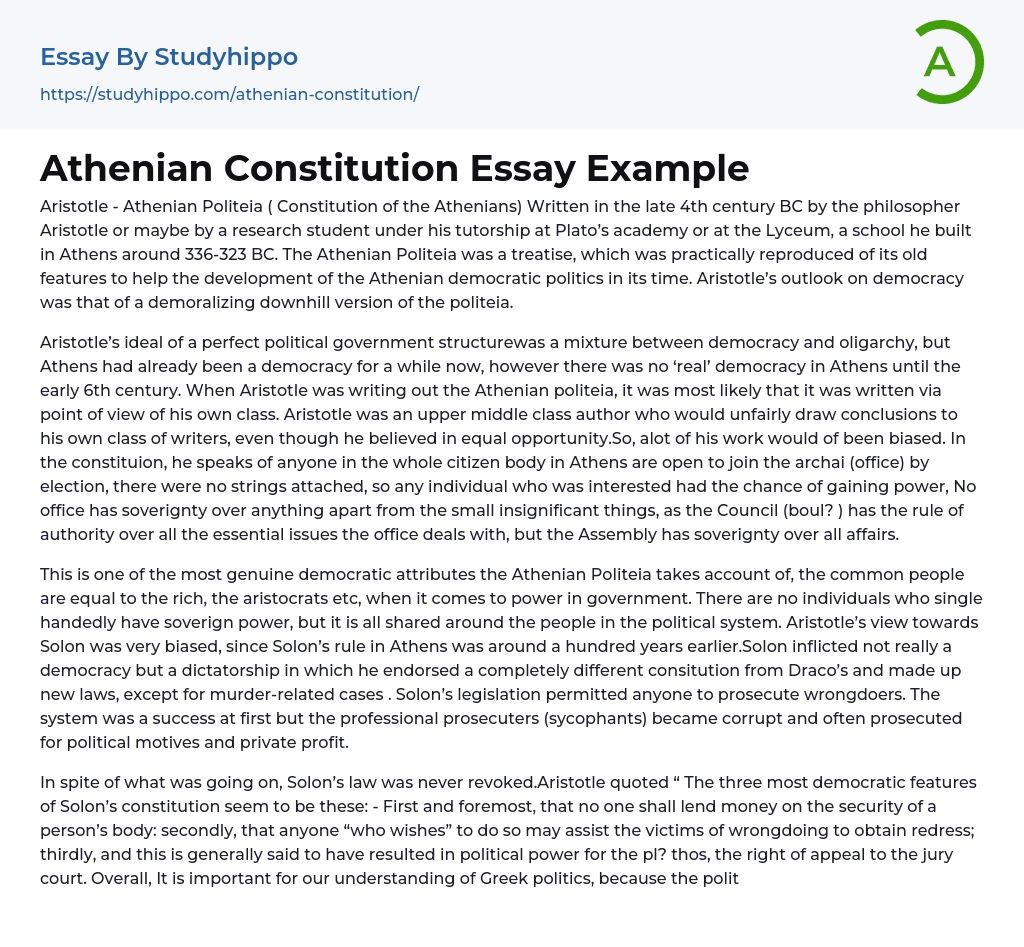Aristotle - Athenian Politeia ( Constitution of the Athenians) Written in the late 4th century BC by the philosopher Aristotle or maybe by a research student under his tutorship at Plato’s academy or at the Lyceum, a school he built in Athens around 336-323 BC. The Athenian Politeia was a treatise, which was practically reproduced of its old features to help the development of the Athenian democratic politics in its time. Aristotle’s outlook on democracy was that of a demoralizing downhill version of the politeia.
Aristotle’s ideal of a perfect political government structurewas a mixture between democracy and oligarchy, but Athens had already been a democracy for a while now, however there was no ‘real’ democracy in Athens until the early 6th century. When Aristotle was writing out the Athenian politeia, it was m
...ost likely that it was written via point of view of his own class. Aristotle was an upper middle class author who would unfairly draw conclusions to his own class of writers, even though he believed in equal opportunity.So, alot of his work would of been biased. In the constituion, he speaks of anyone in the whole citizen body in Athens are open to join the archai (office) by election, there were no strings attached, so any individual who was interested had the chance of gaining power, No office has soverignty over anything apart from the small insignificant things, as the Council (boul? ) has the rule of authority over all the essential issues the office deals with, but the Assembly has soverignty over all affairs.
This is one of the most genuine democratic attributes the Athenian Politeia takes account of, the common people
are equal to the rich, the aristocrats etc, when it comes to power in government. There are no individuals who single handedly have soverign power, but it is all shared around the people in the political system. Aristotle’s view towards Solon was very biased, since Solon’s rule in Athens was around a hundred years earlier.Solon inflicted not really a democracy but a dictatorship in which he endorsed a completely different consitution from Draco’s and made up new laws, except for murder-related cases . Solon’s legislation permitted anyone to prosecute wrongdoers. The system was a success at first but the professional prosecuters (sycophants) became corrupt and often prosecuted for political motives and private profit.
In spite of what was going on, Solon’s law was never revoked.Aristotle quoted “ The three most democratic features of Solon’s constitution seem to be these: - First and foremost, that no one shall lend money on the security of a person’s body: secondly, that anyone “who wishes” to do so may assist the victims of wrongdoing to obtain redress; thirdly, and this is generally said to have resulted in political power for the pl? thos, the right of appeal to the jury court. Overall, It is important for our understanding of Greek politics, because the political system we use today would not exist if it wasn’t for the ancient Greeks making the first contribution to the development of democracy.
- First Amendment essays
- Albert Camus essays
- Aristotle essays
- Carl Jung essays
- Henry David Thoreau essays
- Immanuel Kant essays
- John Dewey essays
- Karl Marx essays
- Machiavelli essays
- Michel Foucault essays
- Plato essays
- Rene Descartes essays
- Rousseau essays
- Socrates essays
- Thomas Hobbes essays
- Athens essays
- Belgium essays
- Berlin essays
- British essays
- England essays
- Germany essays
- Great britain essays
- Greece essays
- Ireland essays
- Italy essays
- London essays
- Paris essays
- Pompeii essays
- Rome essays
- Russia essays
- Spain essays
- United Kingdom essays
- Agreement essays
- Business Law essays
- Common Law essays
- Community Policing essays
- Constitution essays
- Consumer Protection essays
- Contract essays
- Contract Law essays
- Copyright Infringement essays
- Court essays
- Crime essays
- Criminal Law essays
- Employment Law essays
- Family Law essays
- Injustice essays
- Judge essays
- Jury essays
- Justice essays




